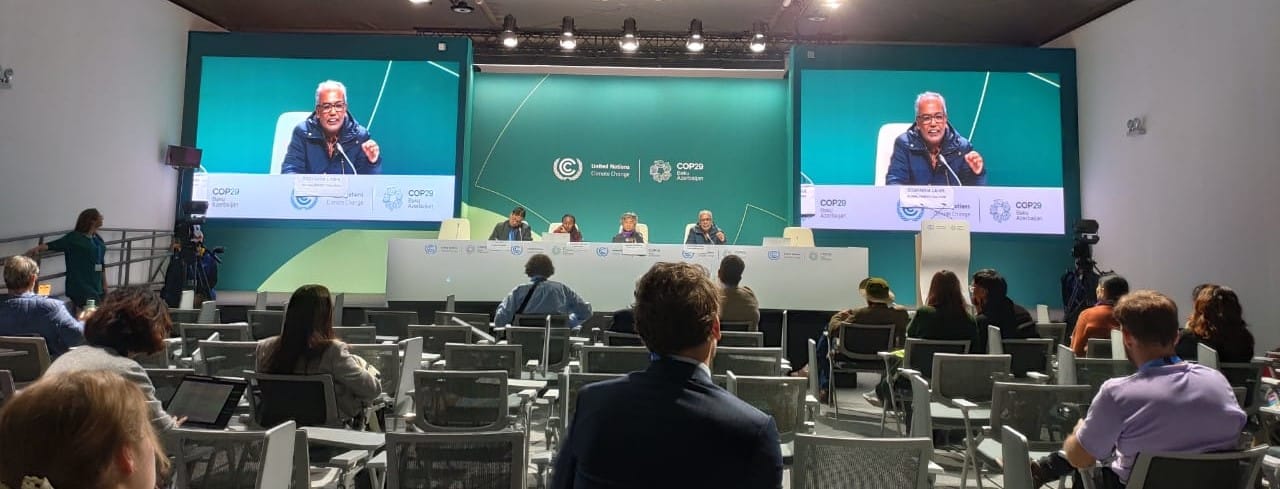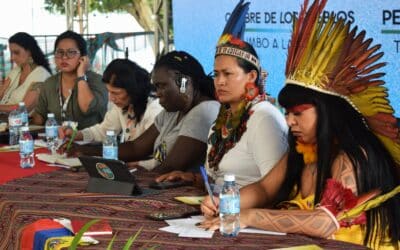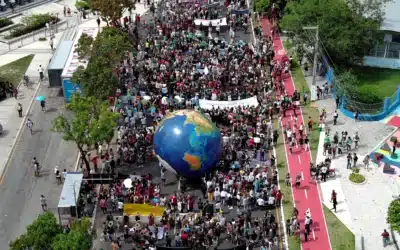«¡Hablemos ya de soluciones reales!», afirma la sociedad civil en la COP29 frente a las falsas soluciones climáticas dominantes
BAKU, 18 de noviembre de 2024 – Los grupos de la sociedad civil presentes en la 19ª Conferencia de las Naciones Unidas sobre el Cambio Climático en Azerbaiyán reclaman que se abandonen los mecanismos impulsados por el mercado y dirigidos por las empresas para hacer frente al cambio climático. Instan a centrarse en soluciones reales para hacer frente a la creciente crisis climática y de biodiversidad, pidiendo a los gobiernos que den prioridad a los enfoques comunitarios y de justicia de género, desafiando el predominio de falsas «soluciones» como los mercados de carbono que socavan los derechos de las comunidades.
… continuar leyendo en inglés
Speaking at a press conference, activists and experts highlighted the transformative potential of grassroots initiatives in tackling climate change, led by Indigenous Peoples, women, and local communities. However, they noted that these real solutions are consistently overshadowed and hindered by corporate interests and lack the necessary financial and policy support to scale up.
“The negotiations here in Baku are filled with empty promises,” said Wanun Permpibul of Climate Watch Thailand and Asia Pacific Forum on Women, Law and Development (APWLD). “The inequalities perpetuating climate change are not side issues; they are central to real solutions and climate justice. The Global North owes a climate debt that must be paid, and systemic change is non-negotiable. Real solutions are already happening, led by communities, but they lack the resources to scale up. The Global North must stop hiding behind market mechanisms and prioritise funding rights-based, community-driven solutions.”
We need to call out the false solutions that are being peddled in these corridors and in the climate spaces, in COPs, and other UN spaces
Civil society groups criticised the heavy presence of over 1,770 fossil fuel lobbyists at COP29, accusing them of drowning out discussions on transformative solutions. From day one, the negotiations faced backlash when Mukhtar Babayev, Azerbaijan’s Minister of Ecology and Natural Resources and COP29 President, fast-tracked carbon market regulations under Article 6.4. This move sidelined extensive party negotiations, which was the usual track for any decision.
“This decision perpetuates a false solution,” said Ana Celestial of the Kalikasan People’s Network for the Environment and APWLD. “It allows polluters to continue business as usual while jeopardising our lives and livelihoods. Climate action must centre on justice, not profit-driven schemes. Our futures are not for sale.”
Although COP29 has been branded the “Finance COP,” many civil society organisations are instead calling it the “False Solutions COP.” They argued that the prominence of carbon offsets, carbon removals, and carbon capture and storage in the policy discourse only distract from the urgent need to phase out fossil fuels and support community initiatives.
Communities must have direct access to these funds because as it stands, farmers and Indigenous Peoples receive less than 0.03% of global climate finance—this must change.
“We need to call out the false solutions that are being peddled in these corridors and in the climate spaces, in COPs, and other UN spaces,” said Souparna Lahiri, Senior Climate and Biodiversity Policy Advisor at the Global Forest Coalition, highlighting the harm caused by false solutions like REDD+ and carbon offsets. “False solutions devastate communities, tearing them away from their land and livelihoods. These policies drown out real solutions, which are rooted in centuries of sustainable practices by Indigenous and local communities. Climate action must be gender-just, ecosystem-based, and community-led to repair the immense damage we’ve caused to the planet.”
Real solutions serve as pathways to broader systems transformation. Ajay Jha, Director of CECOEDECON, said: “This COP is billed as the ‘Finance COP,’ but real climate finance starts with debt cancellation and taxing high net-worth individuals. Communities must have direct access to these funds because as it stands, farmers and Indigenous Peoples receive less than 0.03% of global climate finance—this must change.”
Carolina Muturi, Coordinator of IBON Africa, seconded this by drawing an example from indigenous farming communities in the African continent, where smallholder farmers face significant barriers: “In Kenya, we have the Ogieks community from Mau Complex and Maasai community from Tanzania who are evicted in the guise of conservation of forests while the government gets into deals with corporations to take over management of Africa’s natural resources.” She called on governments to “fund these grassroots efforts, ensuring resources go directly to communities that are regenerating their lands and livelihoods. The time for false promises and corporate-driven agendas is over.”
As COP29 nears its conclusion, civil society groups demand Parties to shift their focus towards people-centred, gender-just solutions that challenge the systemic roots of climate change. They stress that holding Global North countries and corporations accountable for promoting harmful distractions is essential to advancing genuine solutions and ensuring resources reach the communities at the forefront of the fight against the climate crisis.




